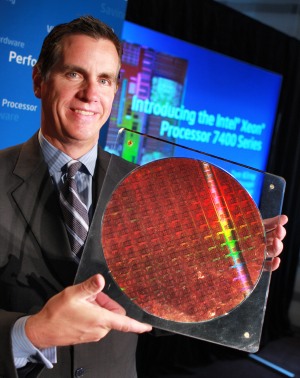Sep 16 2008
Intel Corporation has extended its lead in the high-end server segment, setting new standards in virtualization performance with the launch of seven 45 nanometer (nm)-manufactured Intel® Xeon® Processor 7400 Series products. With up to six processing cores per chip and 16MB of shared cache memory, applications built for virtualized environments and data demanding workloads, such as databases, business intelligence, enterprise resource planning and server consolidation, experience dramatic performance increases of almost 50 percent in some cases.
 Tom Kilroy, vice president and general manager of Intel's Digital Enterprise Group, displays a wafer from Intel's new Xeon 7400 Processor family, formerly code-named Dunnington, Monday, September 15, 2008, at a news conference in San Francisco. Intel today announced the availablity of seven high-end server processors, including the world's first six-core, x86 chip under the Intel Xeon 7400 Processor Series moniker. (Photo for Intel by Court Mast)
Tom Kilroy, vice president and general manager of Intel's Digital Enterprise Group, displays a wafer from Intel's new Xeon 7400 Processor family, formerly code-named Dunnington, Monday, September 15, 2008, at a news conference in San Francisco. Intel today announced the availablity of seven high-end server processors, including the world's first six-core, x86 chip under the Intel Xeon 7400 Processor Series moniker. (Photo for Intel by Court Mast)
Platforms based on these processors can scale up to 16 processor "sockets" to deliver servers with up to 96 processing cores inside, offering tremendous scalability, ample computing threads, extensive memory resources and uncompromising reliability for enterprise data centers.
"The arrival of these processors extends Intel's lead in the high-end server segment," said Tom Kilroy, Intel vice president and general manager of the Digital Enterprise Group. "This new processor series helps IT manage increasingly complex enterprise server environments, providing a great opportunity to boost the scalable performance of multi-threaded applications within a stable platform infrastructure. With new features such as additional cores, large shared caches and advanced virtualization technologies, the Xeon® 7400 series delivers record-breaking performance that will lead enterprises into the next wave of virtualization deployments."
Several Performance Records
The Intel® Xeon® processor 7400 series has already set new four-socket and eight-socket world records on key industry benchmarks for virtualization, database, enterprise resource planning and e-commerce. IBM, following the record-setting 1.2 million tpmC result on its eight-socket System x* 3950 M2 platform, delivers an all-time high result for four-socket servers on System x* 3850 M2 server with a score of 684,508 tpmC on the TPC*-C benchmark, which measures database performance in an online transaction processing environment.
An HP ProLiant DL580 G5 server on the SAP-SD benchmark that measures a server's sales and distribution capability on SAP software set a world record with a score of 5155 SD-Users. On the SPECint*_rate2006 benchmark, which measures a system's integer throughput performance, a Fujitsu-Siemens PRIMERGY* RX600 S4 server set a record with a score of 291. Several other records were also set on other key enterprise-related benchmarks.
Virtualization Platform of Choice
Based on Intel's 45nm high-k process technology and reinvented transistors that use a Hafnium-based, high-k metal gate formula, the new Xeon® 7400 series delivers exceptional performance improvements with lower power consumption. This delivers almost 50 percent better performance in some cases, and up to 10 percent reduction in platform power, and has resulted in a world record VMmark (a virtualization benchmark) score for four-socket, 24 processing core servers at 18.49 on a Dell PowerEdge R900 platform using VMware ESX server v3.5.0.*
These virtualization performance increases, and advanced virtualization capabilities such as Intel Virtualization Technology (VT) FlexMigration make Xeon® 7400 series-based servers ideal platforms for customers to standardize their virtual infrastructures. FlexMigration enables VM migration from previous-, present- and future-generation Core microarchitecture-based platforms. This ensures investment protection for administrators seeking to establish pools of virtualized systems and using those pools to facilitate failover, disaster recovery, load balancing and optimizing server maintenance and downtime.
Product Details, Customers
These products offer frequencies up to 2.66 GHz and power levels down to 50 watts, including the first 6-core, x86 compatible 65-watt version which translates to just under 11 watts per processor core, with platforms available in rack, tower and highly dense blade form factors.
The Xeon® 7400 processor series is compatible with Intel's existing Xeon 7300 series platforms and the Intel® 7300 chipset with memory capacity up to 256GB, allowing IT departments to quickly deploy the new processor into a stable platform infrastructure.
Starting today, servers based on the Intel® Xeon® 7400 processor series are expected to be announced by more than 50 system manufacturers around the world, including four-socket rack servers from Dell, Fujitsu, Fujitsu-Siemens, Hitachi, HP, IBM, NEC, Sun, Supermicro and Unisys; four-socket blade servers from Egenera, HP, Sun and NEC; and servers that scale up to 16-sockets from IBM, NEC and Unisys.
Many software vendors are also supporting Intel® Xeon® 7400 based platforms with innovative solutions enabling virtualization and scalable performance for the high-end enterprise, including Citrix, IBM, Microsoft, Oracle, Red Hat, SAP and VMware.
Pricing for the Xeon® 7000 Sequence processors in quantities of 1,000 ranges from $856 to $2,729. For more details on the Intel® Xeon® 7400 processor series, visit www.intel.com/xeon. For more details on world records and other claims, visit www.intel.com/performance/server/xeon_mp/summary.htm.